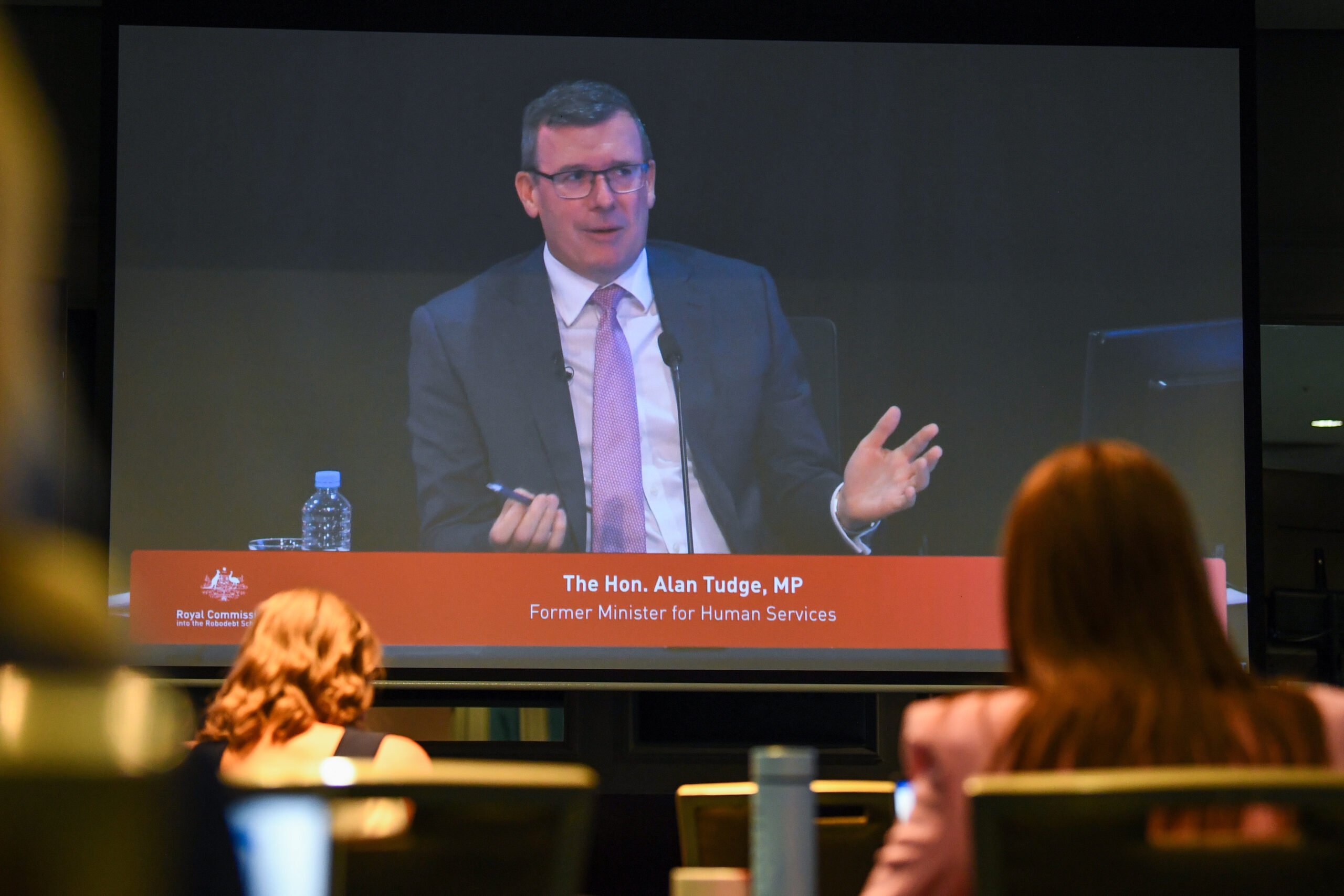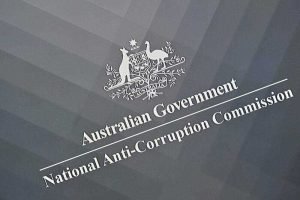The Shot
The Robodebt Royal Commission has exposed the depth of Canberra’s rot

In December 2016, Tracy Grimshaw, hosting A Current Affair, announced the formation of a “special unit” that Centrelink had put in place to crack down on the worst kind of dole bludger. Under the heading “Debt Squad”, her expose featured contributors peaking in popularity at the time, like 2GB’s Chris Smith, Pauline Hanson and Alan Tudge, all of whom were only too eager to explain the rationale for Robodebt. Tudge, still wrapped in the youthful glow of an early major party-political aspirant and the look of a kid in a lolly shop, talked up his Robodebt scheme with smiles ahoy in front of Grimshaw-level audience numbers, proudly explaining its ability to “more quickly and very rapidly capture more people”.
Fast forward to 2023, and Tudge is now appearing with fellow former ministers, senior public servants, contracted consultants and lawyers before Hearing Block 3 at the resumption of the Robodebt Royal Commission. After a $1.8b payout for victims of the scheme in 2021, the hearings began in 2022 and have resumed after a summer adjournment. Previous sessions had seen the former head of the Department of Social Services Director Kathryn Campbell and former Minister for Social Services Scott Morrison appear; proceedings resumed this year with a packed roster of key contributors testifying about their roles in the biggest social security scandal in modern Australian history.
The hearings began with statements from former staff who worked under Campbell, essentially saying that they were afraid of delivering the bad news to their boss, including the draft from law firm Clayton Utz that had found the scheme to be illegal. It heard from a branch manager who rejected concerns brought to her by another senior manager that the department was sitting on this draft.
Over the course of the hearings, Department of Social Services Debt strategy Director Richard Hurman and Manager Russell De Burgh looked vacant as they found the long way around to admitting they withheld key evidence of the scheme’s illegality from the Ombudsman. And the top lawyer at the Department of Human Services, Annette Musolino, demonstrated her failures in the chain of responsibility by admitting she also understood Robodebt to be illegal but was reluctant to bring it to anyone’s attention, doing nothing to address the legal doubts that plagued the scheme.
By the time Tudge sat before the commission with former Minister for Social Services Christian Porter, he seemed to blame everything but himself. The buck stopped with him as Minister for Human Services, he knew of the issues plaguing the scheme, but instead of seeking legal advice on how to proceed, he sought advice to figure out how to persecute anyone that dared tell its morbid tale to the media. If it wasn’t blindingly obvious beforehand, Tudge’s testimony makes it crystal clear that this thing could have been avoided, perhaps some lives saved, had any of these key players performed their job as described in their position descriptions.
Like so many other shitty things baked into the overcooked ‘Turducket’ that became our national politics in the 2010s, Robodebt happened somewhere between Tony Abbott, Malcolm Turnbull and his merry band of freerange cabinetfolk. In this period, a gaggle of LNP superstars were given creative license by Turnbull. As he became detrimentally obsessed with holding up the flapping beams of the broad church as a small target uber-neutral, the political aspirants farted their way into their portfolios with the creative control of gibbons, smearing their funk into what would one day become Morrison’s LNP. Ultimately, Tudge represents the continuity of Robodebt throughout the LNP government, and joins its other architects; Stewart Robert, Christian Porter and Scott Morrison – all of whom championed its legacy. All of whom have appeared before this commission. None of whom will face any real consequence to this national tragedy.
The trial is a glaring example of how the political will of Government and subjective reporting of the press can align with a self-interested public service like a three-body syzygy, eclipsing the line of sight to the people, and cutting off any light to the public. It wasn’t mismanaged taxpayer funds, or poorly implemented policy not benefiting Australia’s interest, nor a shooting club or an undeveloped parking space; it was a diabolical scheme in a ‘jobs for mates’ environment that put real humans into a grave experiment. A bad faith government working in concert with aspirational and unethical senior public servants at the DSS and DHS, schemed together to ensure the outcome at all costs. Those costs were paid with real human lives.
And the consequences for the perpetrators ensconced in the jobs for mates Canberra petri dish?
Tudge goes back to sit alongside Stewart Robert and Scott Morrison in Canberra on the opposition benches, atop plump cushions of overinflated parliamentary salaries and benefits. Kathyrn Campbell, the stalwart of Robodebt, the public-facing-face of the most consequential scandal of our time, has taken a $900k per year posting on the AUKUS committee from the new government, seemingly going from strength to strength. When will this practice end? The Australian people urgently sought accountability and consciously voted for it at the last federal election, and the new government promised this to the electorate.
Why is the proud and integrity focused bureaucracy of Australia starting to feel like it’s changing so suddenly? Could it have anything to do with the stripping back of conventional norms, the blatant appointment of poorly qualified apparatchiks to highly paid positions, the jumping up and down on the nice furniture by a decade of LNP government backed by the full suite of corporate press? In a scandal that makes pink-batts look insignificant, the hive-minded commercial press falls relatively silent. Emotionally neutral in their delivery, and alarmingly shallow in their detail, even the ABC, suffering from its own political appointment affliction, cannot demonstrate the life experience to fathom the rage that is felt about Robodebt. We seethe and simmer at the callousness and arrogance on display, with no one in the mainstream press willing or able to articulate it for us.
How about a country in which there are no more political appointments for top roles in the public service, a place without ministerial captain’s picks, devoid of conflict of interest riddled board members strewn amongst key appointments at tribunals and trusts? What would that take? Perhaps a rotating independent appointments body, or a ban on former politicians qualifying for roles on important advisory boards, maybe a process that excludes former Murdoch trust fund lawyers from managing the Administrative Appeals Tribunal, or something that prevents children of major party powerbrokers getting term-of-natural-life-contracts at the Fair Work Commission till 2047? Whatever it is, something needs to be done.
Robodebt, a government run piece of software, developed lovingly with lines of Canberran public servant and contract-sourced code, was doomed to fail from the start. All of those involved knew Robodebt was broken, that it was illegal, but they kept pushing on, part of the all-consuming glut that had developed the previous decade of LNP. With all the facts at hand, the human consequences revealing themselves – most of those that conceived and delivered this awful and malicious piece of policy despite everything. Everyone involved has pushed on regardless, keeping their jobs and their prestige, with some even earning promotions! Meanwhile, the victims of Robodebt cannot explain their duress, and some are no longer with us as a result.
With the multitude of interlinking fuck-ups strewn among this pockmarked road – the ministerial opportunism, the abrogation of duty of care on behalf of the senior public servants, the omissions of contracted lawyers, the pay-outs and the human toll – all of it seems to have been avoidable if there were anyone along this chain of command who truly cared about the horrible consequences. The Robodebt scheme has left a permanent mark on the nation, it is etched into the memory of so many and into the legacy of those who unleashed it, and it signals an urgent need for change that can no longer be ignored.
More like this
Dave Milner






